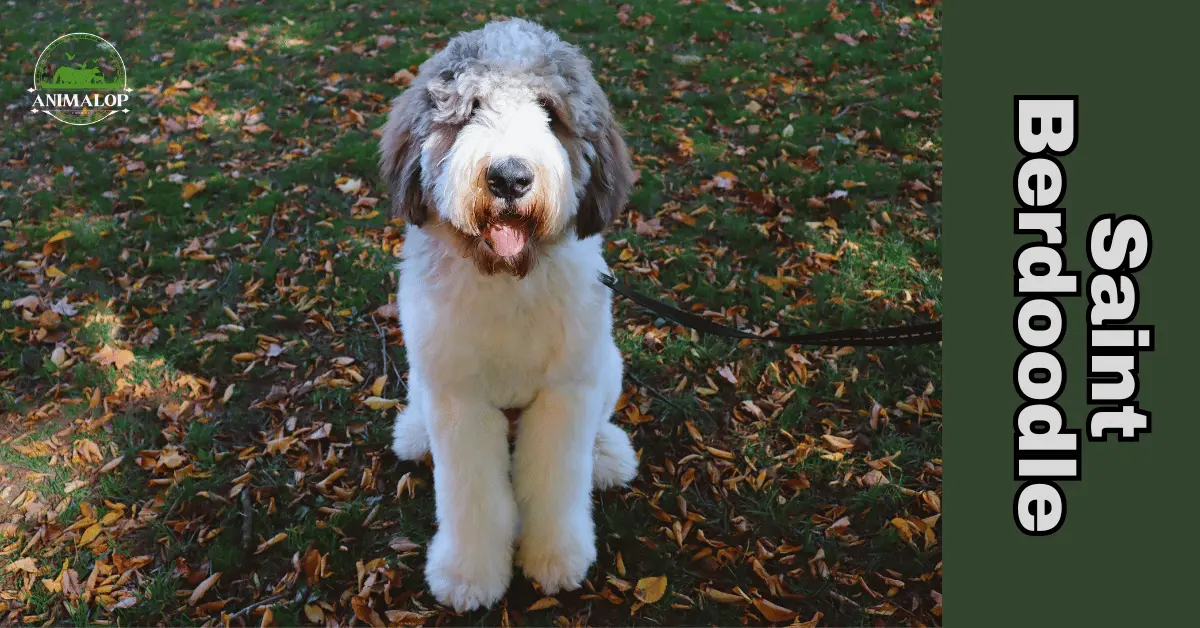Sometimes it is difficult to decide the right dog breed for your family because each breed has unique needs and characteristics. Most definitely, You want a dog that fits your lifestyle and gets along with your family. The process involves many factors such as size, temperament, grooming needs, and exercise requirements.
Saint Berdoodle is the most loving and loyal breed. You can familiarize yourself with this breed’s specific traits and needs to see if it is the right fit for your family. This guide will help you to make an informed decision. Read and explore the Saint Berdoodle’s history, physical characteristics, behavior, and care requirements. This will help you to build a harmonious and fulfilling relationship with your new pet.

The key Attributes Of The Saint Berdoodle
| Attribute | Description | Attribute | Description |
| Breed Name | Saint Berdoodle | Socialization | Enjoys being around people and children |
| Origin | Crossbreed between Saint Bernard and Poodle | Exercise Needs | Moderate exercise needs, daily walks and playtime |
| Size | Large, typically 24 to 30 inches tall | Health Considerations | Prone to hip dysplasia, heart conditions; regular vet check-ups recommended |
| Weight | 70 to 160 pounds | Suitability | Ideal for families, good with children; may experience separation anxiety if left alone |
| Coat | Wavy to curly, medium-length | Hypoallergenic | Often inherits hypoallergenic coat from Poodle parent |
| Coat Care | Regular brushing required to prevent matting | Lifespan | 10 to 12 years |
| Temperament | Gentle, friendly, affectionate, intelligent | Cost | Puppy cost ranges from $1,500 to $3,000; ongoing expenses include food, grooming, veterinary care |
| Trainability | Highly trainable, responds well to positive reinforcement | Best Suited For | Families with children, active individuals who can provide regular exercise and companionship |
Saint Berdoodle History
It is very essential for you as a pet owner to know its breed history and origin. The Saint Berdoodle is a mix between the Saint Bernard and the Poodle. This hybrid combines the best traits of both breeds.
Saint Bernards has a rich history dating back to Roman times. Monks in the Swiss Alps used them to rescue travelers from snowstorms. Their sense of smell and strength made them excellent rescue dogs. In contrast, Poodles originated in Germany. They became popular in France as duck hunters. Their intelligence and agility made them star performers in circuses.
The Saint Berdoodle is a hybrid breed resulting from the mix of these two breeds. This mix creates a dog that is not only strong and reliable but also smart and easy to train. The Saint Berdoodle inherits the Saint Bernard’s gentle nature and the Poodle’s intelligence. Do you know about Mini GoldenDoodle
Characteristics and Appearance
The trend of focusing on physical characteristics and appearance has gained popularity among dog owners and breeders. Knowing a dog’s physical traits helps in understanding its care and maintenance needs. It also allows potential owners to choose a breed that fits their lifestyle and preferences.
The Saint Berdoodle showcases a mix of features from the Saint Bernard and the Poodle. This hybrid breed often inherits the large size of the Saint Bernard, with a coat that combines the Poodle’s curly, hypoallergenic fur. It usually stands between 24 to 30 inches tall and weighs between 70 to 160 pounds.
The coat type is another important characteristic of this breed. Saint Berdoodles often have a coat that blends the Poodle’s curly fur with the Saint Bernard’s dense and rough fur. This unique combination results in a coat that is often wavy and medium-length. It requires regular grooming to keep it healthy and tangle-free.
The facial features of the Saint Berdoodle also reflect its mixed heritage. The dog often has the broad muzzle and expressive eyes of the Saint Bernard, combined with the refined structure of the Poodle. These features give it a friendly and approachable appearance.
Behavioral Traits and Temperament
Being a dog owner you should know the behavioral traits and temperament of this breed. Saint Berdoodles are known for their friendly and affectionate nature. This hybrid breed combines the gentle and patient demeanor of Saint Bernard with the intelligence and playfulness of the Poodle.
One key trait of the Saint Berdoodle is its social nature. “These dogs are very loving and playful. They thrive in a family environment, enjoying outings and play sessions with their human companions. Another important aspect of the Saint Berdoodle’s temperament is its patience and tolerance. This breed gets along well with children. Its gentle nature ensures it can interact safely with kids of all ages.
Undoubtedly, they are friendly by nature, but occasionally they express signs of anxiety. It prefers not to be left alone for extended periods. This breed highlights the need for owners to provide consistent companionship. Regular interaction and engagement with them can help reduce anxiety and ensure they remain content.
The significance of this breed is evident in households with young children. The Saint Berdoodle’s gentle and patient nature makes it an ideal companion. All these characteristics allow parents to trust the breed to interact safely with their kids.
Training Techniques
Saint Berdoodles are a mix of Saint Bernard and Poodle breeds and benefit greatly from structured training. These dogs are intelligent and eager to please, making them highly trainable. Positive reinforcement stands out as an effective technique. This method rewards the dog for good behavior with treats, praise, or playtime, reinforcing positive actions and encouraging repetition.
Consistency is key in training. Repeating commands and routines helps the dog understand what is expected. Daily practice sessions, even if brief, reinforce learning and prevent forgetting. This approach builds a strong foundation for more advanced training later on.
Leash training is essential for large breeds like the Saint Berdoodle. Teaching the dog to walk calmly on a leash prevents pulling and makes walks enjoyable. Start leash training early to establish good habits. Use commands like “heel” and reward the dog for walking beside you. Gradual increase in walk duration and exposure to distractions enhances the dog’s leash manners.
Training a dog involves patience and understanding. Avoid harsh methods or punishment, as these can lead to fear and aggression. Instead, focus on building trust and encouraging positive behavior. Training techniques and approaches are vital in shaping a well-behaved, confident dog. Consistency,.
Exercise Requirements and Activities
If you understand the exercise requirements and provide a variety of activities to your saint Berdoodle, that will keep your sweet dog healthy and happy. Saint Berdoodles has moderate exercise needs. Daily exercise keeps them fit and prevents boredom. A lack of exercise can lead to destructive behavior and health issues.
It is essential to Take the dog for daily walks and aim for at least 30 to 60 minutes of walking each day. This routine helps burn off excess energy and keeps the dog in shape. Walks also provide mental stimulation through new sights, sounds, and smells. Varying the route adds excitement and prevents monotony.
In addition to walks, Saint Berdoodles enjoy playtime. Activities like fetch, tug-of-war, and hide-and-seek engage their playful nature. Playing fetch in a fenced yard or park allows the dog to run freely. This activity promotes physical fitness and strengthens the owner-dog bond.
Social activities also benefit Saint Berdoodles. Taking them to dog parks allows them to interact with other dogs. This socialization helps develop good behavior and reduces anxiety. Supervised playtime with other dogs provides both physical and mental exercise.
Puppies and older dogs have different exercise needs. Puppies require short, frequent play sessions. Avoid over-exercising them to protect their developing joints. Older dogs may need gentler activities. Shorter walks and low-impact exercises like swimming or gentle play keep them healthy without causing strain.
Height and Weight Ranges
Saint Berdoodles are one of the largest Doodle breeds. Typically, their height ranges from 24 to 30 inches at the shoulder. Males often stand taller than females. This height makes them imposing but also elegant in their stature.
Their weight varies widely, from 70 to 160 pounds. The size of the Poodle parent can influence this range. Standard Poodles contribute to a larger size, while Mini Poodles result in smaller Saint Berdoodles. The dog’s diet, exercise, and genetics also play a role in its final weight.
Accurately estimating a Saint Berdoodle’s size helps owners prepare their living spaces. Large dogs require more room to move and stretch. Small apartments may not suit them. A home with a spacious yard offers better accommodation for their size.
Furthermore, if you understand their accurate size you can select appropriate accessories. Large dogs need bigger beds, crates, and toys. Choosing the right sizes ensures the dog’s comfort and prevents injuries. Harnesses and collars should also fit well to provide proper support.
Nutritional Requirements and Feeding Guidelines
Saint Berdoodles need specific nutrition due to their size and activity level. The proper diest ensures their health and happiness. Owners must prioritize balanced nutrition to support their pet’s well-being throughout its life.
Saint Berdoodles are large in size. They need a diet rich in proteins, fats, and carbohydrates. Proteins support muscle development and repair. Lean meats, fish, and eggs are excellent protein sources. Balanced fats provide energy and support cell functions. Healthy fats from fish oil or flaxseed enhance their diet.
It’s a fact, that the feeding guidelines are very helpful for owners to provide the right amount of food. A Saint Berdoodle typically needs 4 to 10 cups of high-quality dog food daily. This range varies based on the dog’s age, weight, and activity level. Puppies require more frequent meals, split into three to four portions. Adult dogs do well with two meals a day.
Special dietary needs may arise. Some dogs have allergies or sensitivities. Identifying these requires careful observation and possibly a vet’s advice. Switching to hypoallergenic or grain-free food may help.
When you feed a balanced diet to your dog it impacts its energy, mood, and longevity. Proper nutrition helps maintain a healthy coat, strong bones, and a robust immune system. Owners must stay informed about the best food choices for their pets.
Health Concerns and Common Issues
The best care for your saint berdoodle is to understand their health concerns and common issues. Proactive measures, regular vet visits, and a balanced lifestyle ensure a healthy and happy life for your pet. Stay informed and attentive to your dog’s needs for optimal health and longevity.
Sometimes both food and the environment cause discomfort. Symptoms include itching, redness, and digestive issues. Identifying the allergen through vet consultation helps in managing the condition. Switching to hypoallergenic food or limiting exposure to certain environments provides relief.
Skin infections, such as hot spots, may occur due to allergies or poor grooming. Keeping your dog’s coat clean and dry prevents these issues. Regular grooming sessions and skin checks help in early detection.
Regular dental care prevents periodontal disease. Brushing your dog’s teeth and providing dental chews reduces plaque buildup. Regular vet check-ups include dental examinations, ensuring overall oral health.
Vaccinations and preventive care protect against common illnesses. Regular vet visits ensure your dog stays up-to-date on vaccinations. Preventive measures, such as flea and tick treatments, keep your dog healthy and comfortable.
Costs of Ownership
Initial costs begin with the purchase price. A Saint Berdoodle puppy from a reputable breeder ranges from $1,000 to $3,000. This price reflects the breeder’s reputation, location, and the puppy’s lineage. Adopting from a rescue organization costs significantly less, typically a few hundred dollars.
Now lets talk about the considered supplies. Your new puppy needs a bed, crate, toys, and grooming tools. These initial supplies can total around $300 to $500. Investing in quality items ensures they last longer and provide comfort and safety for your pet.
Veterinary expenses start immediately. Your puppy requires vaccinations, deworming, and a general health check-up. The first vet visit may cost $100 to $300. Spaying or neutering, if not already done, adds another $200 to $500.
Food is a major ongoing expense. High-quality large-breed food costs about $50 to $100 per month. A Saint Berdoodle eats a substantial amount, so budgeting for food is crucial. Treats and supplements also add to the monthly food expenses.
Healthcare expenses continue throughout your dog’s life. Annual check-ups, vaccinations, and preventive medications cost around $200 to $500 per year. Unexpected illnesses or injuries may require additional funds. Pet insurance, costing $30 to $50 per month, helps cover these unexpected costs.
Saint Berdoodle vs Bernedoodle
Saint Berdoodles and Bernedoodles are both popular mixed-breed dogs. Saint Berdoodles come from a Saint Bernard and Poodle mix, while Bernedoodles are a blend of Bernese Mountain Dog and Poodle. These breeds differ in size. Saint Berdoodles can weigh between 70 and 160 pounds and stand 24 to 30 inches tall. In contrast, Bernedoodles are generally smaller, weighing up to 90 pounds and standing around 23 to 29 inches tall.
Temperament-wise, Saint Berdoodles are known for loyalty and playfulness. They are friendly and enjoy being around people. Bernedoodles are gentle and intelligent. Both breeds require regular grooming due to their varying coat types. Saint Berdoodles may have longer, more prone-to-shedding coats, while Bernedoodles often have softer, less shedding coats. When choosing between these breeds, consider their size, temperament, and grooming needs to find the best fit for your family and lifestyle.
Faqs
Conclusion
Saint Berdoodles are known for their intelligence and trainability, thanks to the Poodle genes, combined with the calm and affectionate temperament of Saint Bernard. The Saint Berdoodle is a unique hybrid breed resulting from the cross between a Saint Bernard and a Poodle. These dogs are excellent as family pets and companions.
They typically have a large size, often weighing between 110 and 200 pounds, and inherit the hypoallergenic coat of the Poodle. These characteristics make them suitable for families with mild allergies.
Owning a Saint Berdoodle comes with responsibilities. They require regular grooming to maintain their coat and balanced diet to support their large size and active nature. Potential owners should also be prepared for health issues common to both parent breeds. Despite these considerations, the Saint Berdoodle is a loving and loyal breed that can make a wonderful addition to the right home.”





2 Comments on “Saint Berdoodle, Important Facts & Unique Characteristics”